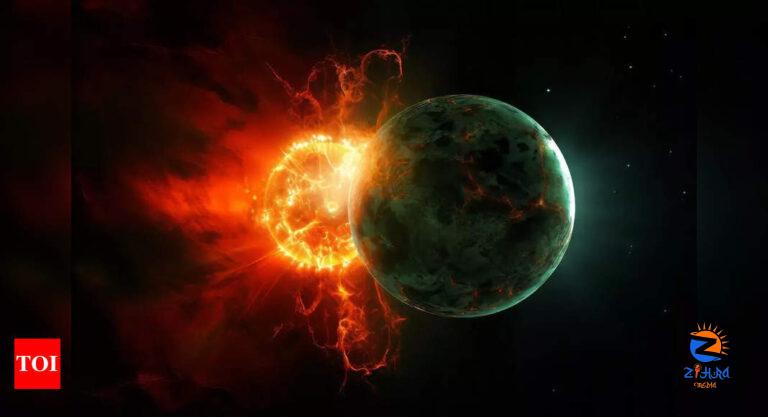
[ad_1]
Solar eclipse happens when the Moon blocks the Sun during a new moon—is a fascinating astronomical phenomenon with profound spiritual meaning. It is seen as a powerful period for introspection, letting go, and personal development. Eclipses force people to face and modify a variety of aspects of their lives by bringing to light previously buried feelings and desires.This results in substantial life transformations. These occasions are crucial turning points in life that help people accept change and grow spiritually.
However, solar eclipse also comes accompanied with many myths and this year let us debunk them and begin our self-reflection journey on the same.
Myth: Solar Eclipses are a Bad Omen
Solar eclipses are astronomical phenomena that occur naturally and are controlled by the Sun’s and Moon’s predictable movements. Eclipses are seen in astrology as opportunities for growth and transformation rather than as signs of impending disaster. They provide chances for introspection and comprehension of oneself, inspiring people to let go of obsolete ideas or behaviours and embrace fresh approaches.
Myth: Looking at a Solar Eclipse Can Blind You
It is true that staring directly at the sun without appropriate eye protection can cause eye damage during a solar eclipse or at any other time. You can, however, safely view an eclipse if you take the right precautions, such as using eclipse glasses or indirect viewing techniques.
Myth: Solar Eclipses are Rare
Solar eclipses happen more often than people realize. While their visibility varies over the world, they occur roughly twice to five times a year. Although total solar eclipses are less frequently in any particular area, eclipses in general are a very common type of astronomical event.
Myth: Solar Eclipses Affect Human & Animal Behavior
There is no proof from science that eclipses have a direct impact on behaviour of either human or animal. Nonetheless, eclipses are seen in astrology as periods of enhanced psychic and emotional sensitivity, which result in self-reflection and awakenings.
Myth: Solar Eclipses increases fertility
According to a popular belief, an eclipse has the potential to boost fertility or influence human reproduction in a variety of different ways. However, there is no basis of the same, and it has no impact on fertility.
Myth: Solar Eclipses Have Supernatural Powers
Although breath-taking, there is no proof that solar eclipses have any supernatural abilities. Astrology views them not as having any direct magical healing abilities, but rather as potent symbolic events that promote reflection and human development. The theory that water exposed to an eclipse offers therapeutic or health advantages is unsupported by any data.
Myth: Sun gets transformed
The sun does not undergo any transformation during an eclipse; it is simply temporarily obscured by the Moon.
The Road Ahead
Solar eclipse is a beautiful time for humans to connect to inner self and self-reflect on our learnings and evolve in our journey.
This article is written by, Sidhharrth S Kumaar, Astro numerologist, Life & Relationship Coach and Founder, NumroVani
However, solar eclipse also comes accompanied with many myths and this year let us debunk them and begin our self-reflection journey on the same.
Myth: Solar Eclipses are a Bad Omen
Solar eclipses are astronomical phenomena that occur naturally and are controlled by the Sun’s and Moon’s predictable movements. Eclipses are seen in astrology as opportunities for growth and transformation rather than as signs of impending disaster. They provide chances for introspection and comprehension of oneself, inspiring people to let go of obsolete ideas or behaviours and embrace fresh approaches.
Myth: Looking at a Solar Eclipse Can Blind You
It is true that staring directly at the sun without appropriate eye protection can cause eye damage during a solar eclipse or at any other time. You can, however, safely view an eclipse if you take the right precautions, such as using eclipse glasses or indirect viewing techniques.
Myth: Solar Eclipses are Rare
Solar eclipses happen more often than people realize. While their visibility varies over the world, they occur roughly twice to five times a year. Although total solar eclipses are less frequently in any particular area, eclipses in general are a very common type of astronomical event.
Myth: Solar Eclipses Affect Human & Animal Behavior
There is no proof from science that eclipses have a direct impact on behaviour of either human or animal. Nonetheless, eclipses are seen in astrology as periods of enhanced psychic and emotional sensitivity, which result in self-reflection and awakenings.
Myth: Solar Eclipses increases fertility
According to a popular belief, an eclipse has the potential to boost fertility or influence human reproduction in a variety of different ways. However, there is no basis of the same, and it has no impact on fertility.
Myth: Solar Eclipses Have Supernatural Powers
Although breath-taking, there is no proof that solar eclipses have any supernatural abilities. Astrology views them not as having any direct magical healing abilities, but rather as potent symbolic events that promote reflection and human development. The theory that water exposed to an eclipse offers therapeutic or health advantages is unsupported by any data.
Myth: Sun gets transformed
The sun does not undergo any transformation during an eclipse; it is simply temporarily obscured by the Moon.
The Road Ahead
Solar eclipse is a beautiful time for humans to connect to inner self and self-reflect on our learnings and evolve in our journey.
This article is written by, Sidhharrth S Kumaar, Astro numerologist, Life & Relationship Coach and Founder, NumroVani
[ad_2]
